Food for thoughts
May 8, 2023
Thesaurus : Soft Law
► Full Reference: Committee on Legal Affairs of the European Parliament, Report on the proposal for a directive of the European Parliament and of the Council on Corporate Sustainability Due Diligence and amending Directive (EU) 2019/1937, 8 May 2023.
____
________

May 4, 2023
Publications

🌐 follow Marie-Anne Frison-Roche on LinkedIn
🌐 subscribe to the Newsletter MAFR Regulation, Compliance, Law
____
► Full reference: M.-A. Frison-Roche, Use of private companies by Compliance Law to serve Human Rights, Working Paper, May 2023.
____
This Working Paper is the basis of:
🎤a conference done in French in Toulouse on June 16, 2023
____
►Summary of this Working Paper: Following the legal tradition, Law creates a link between power with a legitimate source, the State, public power being its prerogative, while private companies exercise their power only in the shadow of this public power exercised ex ante. The triviality of Economic Law, of which Competition Law is at the heart, consisting of the activity of companies that use their power on markets, relegates the action of the State to the rank of an exception, admissible if the State, which claims to exercise this contrary power, justifies it. The distribution of roles is thus reversed, in that the places are exchanged, but the model of opposition is shared. This model of opposition exhausts the forces of the organisations, which are relegated to being the exception. However, if we want to achieve great ambitions, for example to give concrete reality to human rights beyond the legal system within which the public authorities exercise their normative powers, we must rely on a new branch of Law, remarkable for its pragmatism and the scope of the ambitions, including humanist ambitions, that it embodies: Compliance Law.
Compliance Law is thus the branch of Law which makes the concern for others, concretised by human rights, borne by the entities in a position to satisfy it, that is to say the systemic entities, of which the large companies are the direct subjects of law (I). The result is a new division between Public Authorities, legitimate to formulate the Monumental Goal of protecting human beings, and private organisations, which adjust to this according to the type of human rights and the means put in place to preserve them. Corporations are sought after because they are powerful, in that they are in a position to make human rights a reality, in their indifference to territory, in the centralisation of Information, technologies and economic, human, and financial means. This alliance is essential to ensure that the system does not lead to a transfer of political choices from Public Authorities to private companies; this alliance leads to systemic efficiency. The result is a new definition of sovereignty as we see it taking shape in the digital space, which is not a particular sector since it is the world that has been digitalised, the climate issue justifying the same new distribution of roles (II).
________
🔓read the full developments below⤵️
May 3, 2023
Thesaurus : Doctrine
► Référence complète : L. Martinet, V. Rouer et L. Bocquillon, "Premiers jugements sur le fondement de la loi sur le devoir de vigilance des entreprises : le juge des référés entre pédagogie et (sur)interprétation", Actu-Juridique, 3 mai 2023.
____
► Résumé de l'article (fait par les auteurs) : Le 28 février 2023, le tribunal judiciaire de Paris s’est prononcé pour la première fois, en référé, sur l’application du devoir de vigilance issu de la loi n° 2017-399 du 27 mars 2017 dans une affaire relative au méga projet pétrolier mené par TotalEnergies et ses filiales en Ouganda et en Tanzanie, à la suite de l’assignation de différentes organisations non gouvernementales françaises et ougandaises. Cette affaire, la première du genre, s’inscrit dans la mise en œuvre d’une loi dont les députés français espéraient qu’elle «marque une rupture dans la mondialisation ».
____
🦉Cet article est accessible en texte intégral pour les personnes inscrites aux enseignements de la professeure Marie-Anne Frison-Roche
________
April 25, 2023
Interviews
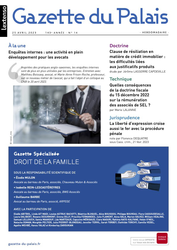
♾️follow Marie-Anne Frison-Roche on LinkedIn
♾️subscribe to the Newsletter MAFR Regulation, Compliance, Law
____
► Full Reference: M.-A. Frison-Roche & M. Boissavy, "Enquêtes internes : une activité en plein développement pour les avocats" ("Internal investigations: a growing business for attorneys"), interview with Miren Lartigue, Gazette du Palais, 25 April 2023.
____
💬read the interview (in French)
____
► Presentation of the interview by the journal (in French): "Inspirées des Anglo-saxons et boostées par la loi Sapin II du 9 décembre 2016, les enquêtes internes sont de plus en plus utilisées par les entreprises françaises pour vérifier la réalité de pratiques douteuses en leur sein, découvertes ou alléguées. Parce qu’il s’agit d’un nouveau champ d’activité pour les avocats, le Conseil national des barreaux (CNB) y a consacré une journée lors de son colloque organisé les 20 et 21 avril 2023 sur le thème « Avocat et droits de la défense dans les enquêtes internes et la justice négociée », qui a réuni 750 participants sur deux jours. Matthieu Boissavy et Marie-Anne Frison-Roche, qui ont participé à l’organisation de cet évènement, nous expliquent les contours de ce nouveau métier."
____
► Questions asked (in French):
- Quels sont la place et le rôle de l’avocat dans les enquêtes internes et pourquoi le CNB a-t-il souhaité organiser une journée consacrée à ce sujet ?
- Quel est leur rôle dans la réception des alertes ?
- Et dans l’enquête interne proprement dite ?
- Quelle est la complémentarité de l’avocat avec le juriste interne ?
- Quels sont outils utilisés pour le calcul des préjudices, la collecte et le traitement des données ?
- Comment s’applique la déontologie de l’avocat ?
- Et qu’en est-il des droits de la défense ?
- Quelle est l’étendue du secret professionnel de l’avocat ?
________

April 25, 2023
Publications

🌐follow Marie-Anne Frison-Roche on LinkedIn
🌐subscribe to the Newsletter MAFR Regulation, Compliance, Law
____
 ► Full Reference: M.-A. Frison-Roche, The role of the Judge in the deployment of Regulatory Law through Compliance Law, Working Paper, April 2023.
► Full Reference: M.-A. Frison-Roche, The role of the Judge in the deployment of Regulatory Law through Compliance Law, Working Paper, April 2023.
____
🎤 This working paper was drawn up to serve as the basis for the concluding summary session of the colloquium organised by the Conseil d'Etat (French Administrative Supreme Court) and the Cour de cassation (French Judicial Supreme Court), De la régulation à la compliance: quel rôle pour le juge? ("From Regulation to Compliance: what role for the Judge?") held on 2 June 2023 at the Conseil d'Etat.
____
📝 This working paper also served as the basis for the article that concludes the book De la régulation à la compliance : quel rôle pour le juge, published by the La Documentation Française, 2024.
____
► Working Paper Summary: It is remarkable to note the unity of conception and practice between professionals who tend to work in administrative jurisdictions and professionals who tend to work in judicial jurisdictions: they all note, in similar terms, an essential movement: what Regulatory Law is, how it has been transformed into Compliance Law, and how in one and even more so in the other the Judge is at the centre of it. Judges, as well as regulators and European officials, explain this and use different examples to illustrate the profound transformation this has brought about for the law and for the companies responsible for increasing the systemic effectiveness of the rules through the practice and dissemination of a culture of compliance. The role of the judge participating in this Ex Ante transformation is renewed, whether he is a public law judge or a private law judge, in a greater unity of the legal system.
____
🔓read the Working Paper below⤵️
April 24, 2023
Thesaurus : Autorité des Marchés Financiers (A.M.F.)
Référence complète : AMF, Com. sanctions, Décision n° 4 du 24 avril 2023, Melanion Capital
____
_____
April 23, 2023
Thesaurus : Doctrine
► Référence complète : F. Vessio, « Réflexion sur les critères de définition de la compliance - Approche restrictive à l'aune du droit positif », JCP E 2023, n° 23, p. 1177
____
🦉Cet article est accessible en texte intégral pour les personnes inscrites aux enseignements de la professeure Marie-Anne Frison-Roche
________
April 21, 2023
Thesaurus : 03. Conseil d'Etat
► Full Reference: Conseil d'État (French Council of State), 2nd and 7th chambers reunited, 21 April 2023, n° 464349, Société Orange.
____
🏛️read the decision (in French)
________
April 20, 2023
Thesaurus : Doctrine
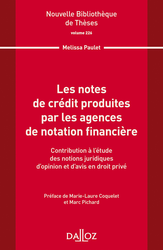
► Référence complète : M. Paulet, Les notes de crédit produites par les agences de notation financière. Contribution à l'étude des notions juridiques d'opinion et d'avis en droit privé, préf. M.-L. Coquelet & M. Pichard, Dalloz, coll. "Nouvelle Bibliothèque de Thèses", vol. 226, 2023, 592 p.
____
____
📗lire le sommaire de l'ouvrage
____
📗lire la table des matières de l'ouvrage
____
► Résumé de l'ouvrage (fait par l'éditeur) : "Le règlement (CE) n° 1060/2009 du 16 septembre 2009 relatif aux agences de notation est généralement lu à partir du postulat selon lequel celles-ci exerceraient un pouvoir exorbitant sur les investisseurs. Dans ce cadre, la réglementation des agences est conçue comme un corps de normes exceptionnel, apprécié à l’aune de son aptitude à encadrer ce pouvoir et à protéger les intérêts des investisseurs. Cette approche théorique ne rend cependant pas compte de la véritable rationalité de la réglementation des agences, laquelle se borne à organiser l’activité de notation et le statut des agences en appliquant aux notes le régime juridique conforme à leur double nature : elles sont des opinions – qui plus est des opinions financières à raison de leur objet –, c’est-à-dire des affirmations subjectives exprimant des vérités relatives quant au risque de défaut d’un émetteur de titres financiers ; elles sont des avis, c’est-à-dire des opinions consacrées par le droit aux fins d’éclairer une décision, en ce qu’elles sont inscrites dans des procédures décisionnelles du législateur en matière bancaire et financière.
Comme toute opinion, les notes peuvent être librement exprimées, sous réserve d’être fondées sur une base factuelle suffisante afin de protéger les intérêts des personnes sur lesquelles elles portent, à savoir les émetteurs de titres financiers. Comme toute opinion financière, elles se voient appliquer la réglementation relative aux abus de marché dès lors qu’elles revêtent une valeur informationnelle afin de protéger les marchés financiers.
Comme tout avis, elles sont soumises à un principe d’intégrité qui vise à préserver la subjectivité technique des agences qui est déterminante de la consécration de leurs notes au rang d’avis.".
________
April 20, 2023
Conferences
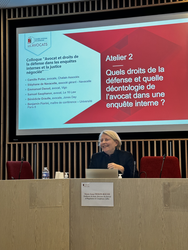
♾️ suivre Marie-Anne Frison-Roche sur LinkedIn
♾️s'abonner à la Newsletter MAFR Regulation, Compliance, Law
____
► Référence complète : M.-A. Frison-Roche, synthèses de chacune des 8 tables-rondes et synthèse finale, in Conseil National des Barreaux (CNB), L'avocat et les droits de la défense dans les enquêtes internes et la justice négociée, Paris, 20 et 21 avril 2023.
____
🧮Consulter le programme complet de cette manifestation
🧮Retrouver le programme dans lequel les vidéos sont insérées
📕Consulter une première présentation de l'ouvrage dirigé par Marie-Anne Frison-Roche et Matthieu Boissavy.
____
Dans la journée du 20 avril 2023
consacrée plus particulièrement aux enquêtes internes
🎥regarder le film de la première session, ayant pour thème : Des avocats dans les enquêtes internes : pourquoi, avec qui et avec quels outils ? cliquer ICI
____
🎥regarder le film de la deuxième session, ayant pour thème : Quels droits de la défense et quelle déontologie de l'avocat dans une enquête interne ? cliquer ICI
____
🎥regarder le film de la troisième session, ayant pour thème : Les enquêtes internes en matière sociale : cliquer ICI
____
🎥regarder le film de la quatrième session, ayant pour thème : Les enquêtes internes dans la lutte anti-corruption et pour le respect du devoir de vigilance : cliquer ICI (la synthèse porta à la fois sur cette 4ième session et sur l'ensemble de la journée)
________
Dans la journée du 21 avril 2023
consacrée plus particulièrement à la CJIP et à la CRPC
🎥regarder le film de la première session, ayant pour thème : Théorie et pratique de la négociation dans la justice pénale cliquer ICI
____
🎥regarder le film de la deuxième session, ayant pour thème : Le rôle du juge, du procureur, du justiciable et de l'avocat dans une CRPC et une CJIP cliquer ICI
____
🎥regarder le film de la troisième session, ayant pour thème : Combinaison des CRPC et des CJIP : enjeux, défis et perspectives cliquer ICI
____
🎥regarder le film de la quatrième session, ayant pour thème : Analyse comparative internationale de la justice négociée et prospective cliquer ICI
____
🎥regarder le film de la troisième session, ayant pour thème : Combinaison des CRPC et des CJIP : enjeux, défis et perspectives cliquer ICI
____
April 18, 2023
Newsletter MAFR - Law, Compliance, Regulation

♾️ follow Marie-Anne Frison-Roche on LinkedIn
♾️ subscribe to the Newsletter MAFR Regulation, Compliance, Law
____
► Full Reference: M.-A. Frison-Roche, "Pour un consommateur "vigilant" : l'éduquer. Analyse juridique" ("For a "vigilant" consumer: educate him. Legal analysis"), Newsletter MAFR - Law, Compliance, Regulation, 18 April 2023.
____
📧Read by freely subscribing other news of the Newsletter MAFR - Law, Compliance, Regulation
____
🔴For an efficient Compliance Law: an Ex Ante responsibility in alliance with consumer expectations
A survey confirms that consumers integrate the monumental goals that generate compliance duties and obligations on the companies that sell them products. But this does not create a duty on them to prefer these products over others: they do not feel "responsible" for them. Compliance Law is based on ex ante responsibility and shared duty. So, faced with this attitude, what can the Law do?
____
📧read the article ⤵️
April 17, 2023
Newsletter MAFR - Law, Compliance, Regulation

♾️ follow Marie-Anne Frison-Roche on LinkedIn
♾️ subscribe to the Newsletter MAFR Regulation, Compliance, Law
____
► Full Reference: M.-A. Frison-Roche, "Dans les causes systémiques : "délibérer" plutôt que "se disputer"" ("In systemic causes: 'deliberate' rather than 'argue'"), Newsletter MAFR - Law, Compliance, Regulation, 17 April 2023.
____
📧Read by freely subscribing other news of the Newsletter MAFR - Law, Compliance, Regulation
____
🔴To deal with "systemic causes", including systemic cases of compliance, move from "argument" to "deliberation" from the start
Compliance Law involves systems, for example banking, financial, digital, health, etc. When a dispute is brought before a judge, this dimension remains, whether before a judge of the Law or a judge of the merits, whether before a civil, criminal, commercial, administrative or European judge, etc. The judge's office must be adapted accordingly. And this is in the process of being done.
____
📧read the article ⤵️
April 13, 2023
Conferences
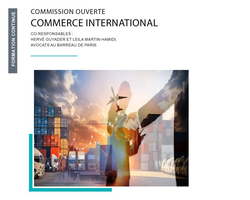
♾️ suivre Marie-Anne Frison-Roche sur LinkedIn
♾️s'abonner à la Newsletter MAFR Regulation, Compliance, Law
____
► Référence complète : M.-A. Frison-Roche, participation à la Table-Ronde sur La dynamique du Droit de la compliance, avec Clara Ingen-Housz, chief ethics and compliance officer, antitrust group legal counsel Saint-Gobain, et Hervé Guyader, avocat à la Cour et responsable de la commission Commerce international de l'Ordre des avocats du Barreau de Paris, Maison du barreau, 13 avril 2023.
____
____
présentation de l'intervention :

April 7, 2023
Organization of scientific events
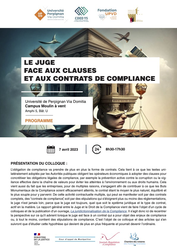
► Référence complète : Walid Chaiehloudj et M.-A. Frison-Roche (dir.), Journal of Regulation & Compliance (JoRC) et Faculté de Droit de Perpignan, Le juge face aux clauses et aux contrats de compliance, Faculté de droit de Perpignan, 7 avril 2023
____
🏗️Ce colloque s'inscrit dans le cycle de colloques organisé par le Journal of Regulation & Compliance (JoRC) et ses Universités partenaires, portant en 2023 sur le thème général de L'Obligation de Compliance.
____
📚Les travaux s'inséreront ensuite dans les ouvrages :
📕Contrat et Compliance, à paraître dans la collection 📚Régulations & Compliance, coéditée par le Journal of Regulation & Compliance (JoRC) et Dalloz, publié en langue française.
📘Compliance & Contract, à paraître dans la collection 📚Compliance & Regulation, coéditée par le Journal of Regulation & Compliance (JoRC) et Bruylant, publié en langue anglaise.
____
► Présentation générale du colloque : L'obligation de compliance va prendre de plus en plus la forme de contrats. Cela tient à ce que les textes unilatéralement adoptés par les Autorités publiques obligent les opérateurs économiques à adopter des clauses pour concrétiser les obligations légales de compliance, par exemple la prévention active contre la corruption ou la vigilance effective dans la chaîne de valeurs pour éviter les atteintes à l'environnement ou aux droits humains. Cela vient aussi du fait que les entreprises, pour de multiples raisons, s'engagent afin de contribuer à ce que les Buts Monumentaux de la Compliance soient efficacement atteints, le contrat étant le moyen le plus naturel, équilibré et le plus souple pour y parvenir.
De cette activité contractuelle multiple, qui peut se manifester soit par des contrats complets, des "contrats de compliance", soit par des stipulations qui s'éloignent plus ou moins des réglementations, le juge n'est jamais loin, parce que le juge est toujours, quel que soit le système juridique et le type de contrat, actif en la matière.
Le rapport général entre le Juge et le Droit de la Compliance vient de faire l'objet d'un cycle de colloques et de la publication d'un ouvrage, La juridictionnalisation de la Compliance. Il s'agit donc ici de recentrer la perspective sur ce qu'il advient lorsque le juge est face à un contrat qui a pour objet des enjeux de compliance ou, à tout le moins, contient des stipulations de compliance.
C'est l'objet de ce colloque et des articles qui s'en suivront que d'étudier cette hypothèse qui devient de plus en plus fréquente et pourrait devenir l'ordinaire.
____
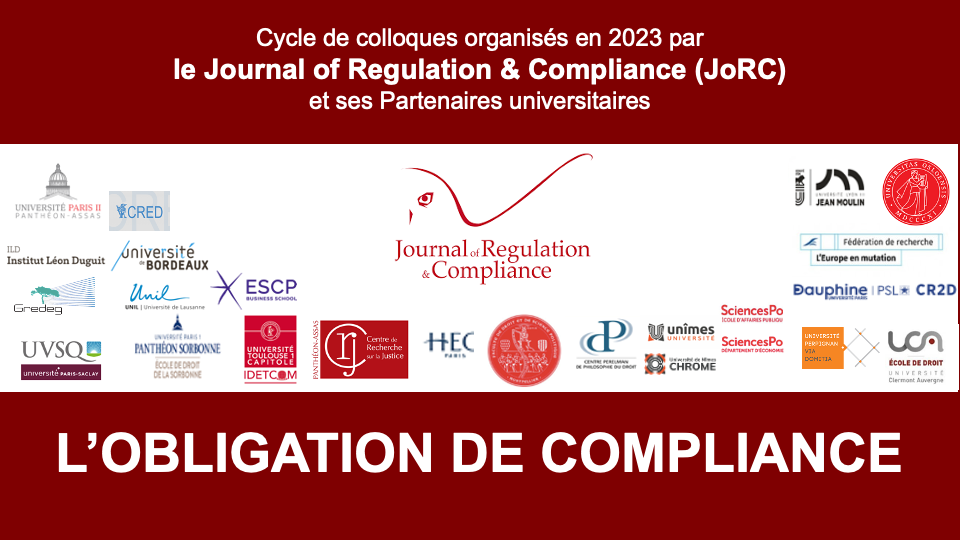
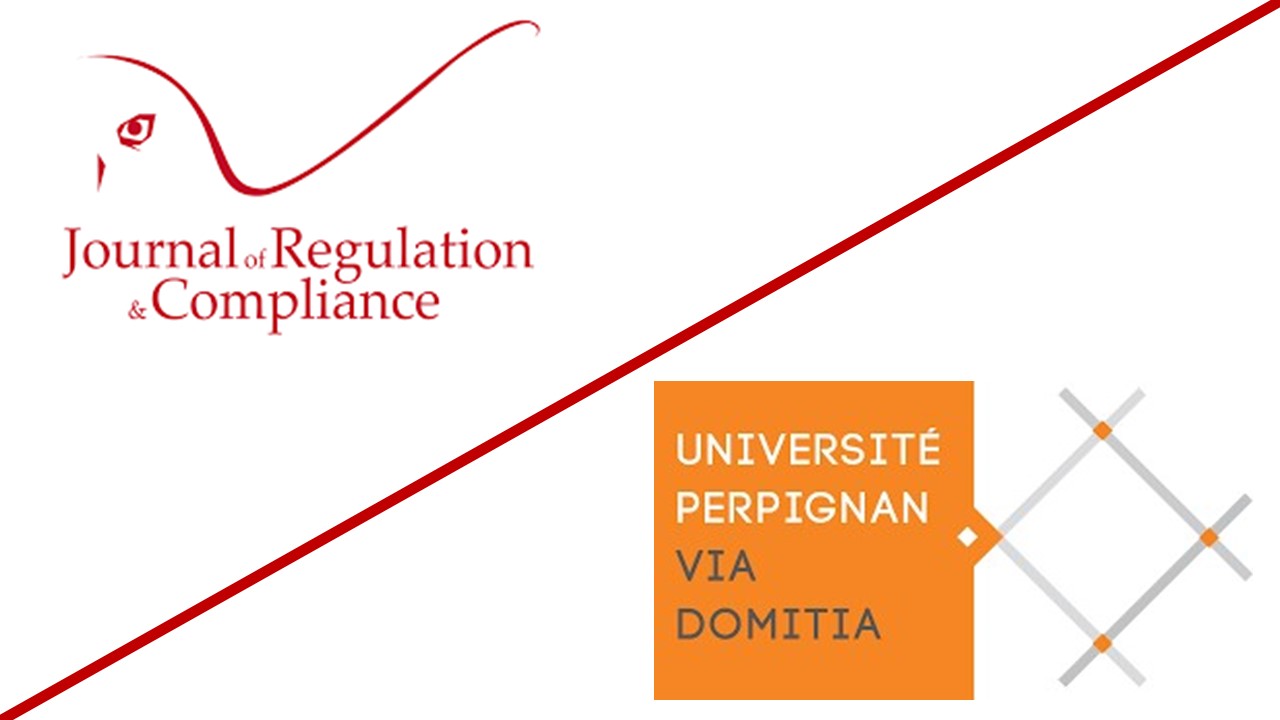
____
► Interviennent :
🎤 Sarah Andjechairi-Tribillac, maître de conférences à l'Université de Perpignan
🎤 Jean-Baptiste Barbieri, maître de conférences à l'Université Paris Panthéon-Assas (Paris 2)
🎤 Walid Chaiehloudj, professeur à la Faculté de Droit de Perpignan
🎤 Marie-Anne Frison-Roche, professeur de Droit de la Régulation et de la Compliance, directrice du Journal of Regulation & Compliance (JoRC)
🎤 Thibault Goujon-Bethan, professeur à l'Université Jean Moulin Lyon 3
🎤 Nicolas Ida, maître de conférences à Aix-Marseille Université
🎤 Hania Kassoul, maître de conférences à l'Université Côté d'Azur
🎤 Rebecca Legendre, professeur à l'Université de Nanterre
🎤 Grégoire Leray, professeur à l'Université Côté d'Azur
🎤 Yves Picod, professeur émérite à l'Université de Perpignan
🎤 Marc Segonds, professeur à l'Université Toulouse Capitole
🎤 Sandrine Tisseyre, professeure à l'Université Toulouse Capitole
🎤 Antoine Touzain, professeur à l'Université de Rouen
____
Lire une présentation détaillée de la manifestation ci-dessous⤵️
April 6, 2023
Interviews

♾️follow Marie-Anne Frison-Roche on LinkedIn
♾️subscribe to the Newsletter MAFR Regulation, Compliance, Law
____
► Full Reference: M.-A. Frison-Roche & M. Boissavy, "Avocat et droits de la défense dans les enquêtes internes et la justice négociée" ("Attorneys and rights of the defence in internal investigations and negociated justice"), interview with Marina Brillié-Champaux, Dalloz Actu Étudiant, 6 April 2023.
____
💬read the interview (in French)
____
► Presentation of the interview by the journal (in French): "Futurs avocats, c’est à vous que s’adresse cette interview de Marie-Anne Frison-Roche, agrégée des Facultés de Droit, directrice du Journal of Regulation & Compliance (JoRC) et de Matthieu Boissavy, avocat aux barreaux de Paris et de New York, médiateur, membre du Conseil National des Barreaux, vice-président de la commission Libertés et droits de l’Homme. Les 20 et 21 avril 2023 le Conseil national des barreaux, sous l’impulsion de ses commissions Libertés et droits de l’Homme et Droit et Entreprise, organise un colloque sur le thème « Avocat et droits de la défense dans les enquêtes internes et la justice négociée ». Si vous êtes déjà dans la profession, il se peut que leurs réponses vous intéressent pour le respect du droit à la justice !"
____
► Questions asked (in French):
- En quoi consistent les enquêtes internes ?
- Qu’appelle-t-on la justice négociée ?
- Qu’attendez-vous de ce colloque ?
Le questionnaire de Désiré Dalloz
- Quel est votre meilleur souvenir d’étudiant ?
- Quels sont votre héros et votre héroïne de fiction préférés ?
- Quel est votre droit de l’Homme préféré ?
________
April 6, 2023
Newsletter MAFR - Law, Compliance, Regulation

🌐 follow Marie-Anne Frison-Roche on LinkedIn
🌐 subscribe to the Newsletter MAFR Regulation, Compliance, Law
____
► Full Reference: M.-A. Frison-Roche, "La "rationalité délibérative" et l'usage adéquat de l'impératif de vigilance" (""Deliberative rationality" and the proper use of the vigilance imperative"), Newsletter MAFR - Law, Compliance, Regulation, 6 April 2023.
____
📧Read by freely subscribing other news of the Newsletter MAFR - Law, Compliance, Regulation
____
🔴The deliberative public space, a model method for the implementation of the duty of vigilance
In this new article of April 6, 2023 of the Newsletter MAFR - Law, Compliance, Regulation, the political philosophy construction that Habermas exposes about social networks and the method that the implementation of the duty of vigilance requires are correlated. Indeed, Habermas continues to advocate a space for discussion, contradiction, deliberation, opinion that can act with rationality. Communication and mediation are essential to ensure that the future, which is the object of vigilance, will not be a catastrophe: this monumental goal of compliance, of which Vigilance is a part, implies it.
____
📧read the article ⤵️
April 5, 2023
Thesaurus : Doctrine
► Full Reference : N. Moreno Belloso & N. Petit, "The EU Digital Markets Act (DMA). A Competition Hand in a Regulatory Glove", (2023) 48 European Law Review 391, available at SSRN: https://ssrn.com/abstract=4411743
____
► Summary of the article (made by the Authors) : "The newly enacted Digital Markets Act (DMA) finds itself at a crossroads. The DMA can develop into a specialist field of competition law for digital platforms or it can evolve into a new field of EU law, detached from competition law. The DMA’s ultimate trajectory will depend on the legal characterization given to the DMA. Is it a special competition law regime or an original instrument distinct from competition law? This paper lays the groundwork for characterizing the DMA by offering a complete descriptive analysis of the instrument. Among the elements discussed are the twin concepts of “gatekeepers” and “core platform services”, which together condition the DMA’s scope of application, as well as the legal obligations imposed on gatekeepers. The paper proposes a novel categorisation of the obligations, showing that each obligation can be associated with at least one of two conventional competition law concerns (exclusion or exploitation). The discussion shows the difficulty of pinpointing the exact nature of the DMA. We argue that this ambiguity creates challenges for the practical implementation of the DMA.".
____
🦉This article is available in full text to those registered for Professor Marie-Anne Frison-Roche's courses
________
April 4, 2023
Thesaurus : Doctrine
► Référence complète : A. Danis-Fatôme & N. Hoffschir, "La loi sur le devoir de vigilance rendue ineffective par le juge", Revue des sociétés, 2023, p.793.
____
🦉Cet article est accessible en texte intégral pour les personnes inscrites aux enseignements de la Professeure Marie-Anne Frison-Roche
________
April 4, 2023
Newsletter MAFR - Law, Compliance, Regulation

♾️ follow Marie-Anne Frison-Roche on LinkedIn
♾️ subscribe to the Newsletter MAFR Regulation, Compliance, Law
____
► Full Reference: M.-A. Frison-Roche, "Face aux clauses de Compliance : le Juge (colloque du 7 avril 2023)" ("Facing Compliance clauses: the Judge (symposium of 7 April 2023)"), Newsletter MAFR - Law, Compliance, Regulation, 4 April 2023.
____
📧Read by freely subscribing other news of the Newsletter MAFR - Law, Compliance, Regulation
____
Compliance Law is starting to be known; mainly through two blocks:
Firstly the spectacular sanctions by which it made as its entry in Europe by the "BNPP sanction" of 2014.
🔴M.-A. Frison-Roche, 📝Le Droit de la Compliance, 2016
Secondly, the accumulation of tools, legal and non-legal, with which companies have equipped themselves: plans to detect and prevent breaches, internal investigations, mapping, ad hoc training, etc.
🔴M.-A. Frison-Roche (dir), 📘Compliance Tools, 2021
But what is the "compliance obligation" in the name of which these fearful and heavy sanctions are pronounced and these new and multiple tools are put in place?
We do not have a very clear idea.
That is why the Journal of Regulation & Compliance (JoRC) and its partner universities have chosen to focus on the topic of the Compliance Obligation in a series of symposiums held in 2023.
🔴JoRC, 🏗️L'obligation de compliance, 2023
It could be said that the company is "obliged" by Compliance because it is obliged by the Law, as Compliance would only mean obeying "regulations" (a term used to describe everything that is obligatory, from the Constitution to ethical charters, etc.). The English vocabulary "comply with" suggests this, as does the Chinese practice of Compliance. The difference would then only be the fact that the company shows its "stakeholders" that it does in fact respect all these texts that commit it.
But the practice and the jurist remember that what is sometimes considered as the heart of the Law, since Roman Law, is Obligations Law, having as its object Contract Law and Tort Law.
Yet, in practice, companies have put contracts concerning compliance everywhere, and they are relatively little studied.
🔴M.-A. Frison-Roche, 📝Contrat de compliance, clauses de compliance, 2023
These may be entire contracts whose very purpose is to entrust another with the task of fulfilling all or part of the compliance obligation incumbent on the company, with regard to personal data.
These may be clauses inserted in contracts with another purpose, for instance sales contracts in a value chain, where the company stipulates that the other company will also ensure compliance obligations for itself or for the other company, e.g. detect and prevent corruption, be vigilant, etc.
Contract Law has already taken on compliance in practice, especially in long-term economic transactions with an international dimension.
The judge has always been present in Obligation Law.
How is the triangle articulated: Judge - Compliance - Obligation?
The Judge has been present from the outset in the development of the Compliance Obligation through criminal liability, administrative liability and the obligation for the company to become a judge of itself, particularly through internal investigations.
🔴M.-A. Frison-Roche (dir.), 📘Compliance Jurisdictionalisation, 2023
The Judge is also present through Obligation Law stricto sensu, first of all through liability, which is transformed under the effect of the compliance system, which operates more in the logic of "accountability" and generates legal mechanisms of "ex ante liability".
🔴M.-A. Frison-Roche, 📝La responsabilité Ex Ante, pilier du Droit de la Compliance, 2022
In contractual matters, the Judge will intervene, in particular with regard to the stipulations which, in the contracts which form the architecture of the value chains, ensure the efficacy (and no longer only the effectiveness) of the duty of vigilance.
The Judge will then intervene under the French law of 2017, known as the "Vigilance Law",
🔴M.-A. Frison-Roche, 🚧Vigilance, Buts Monumentaux de la Compliance et "Société vigilante", 2023
but also, because the Judge is the "judge of the contract", he will intervene as such.
To identify the Obligation of Compliance,
🔴M.-A. Frison-Roche (dir.), 📘Compliance Obligation, 2024
it is therefore necessary to analyse the way in which the Judge apprehends or should in the future apprehend contracts and compliance clauses.
That's why, in the above-mentioned cycle of symposiums, a symposium is being held on 7 April 2023. It is co-organised by the Journal of Regulation & Compliance (JoRC) and the Law Faculty of Perpignan, and has been designed under the scientific direction of Walid Chaiehloudj and Marie-Anne Frison-Roche.
________
April 3, 2023
Interviews

♾️follow Marie-Anne Frison-Roche on LinkedIn
♾️subscribe to the Newsletter MAFR Regulation, Compliance, Law
____
► Full Reference: M.-A. Frison-Roche & M. Boissavy, "Colloque : « Avocat et droits de la défense dans les enquêtes internes et la justice négociée »" ("Symposium: "Lawyers and rights of the defence in internal investigations""), interview with Olivia Dufour, Actu-Juridique, 3rd April 2023.
____
💬read the interview (in French)
____
► Presentation of the interview by the journal (in French): "Le Conseil national des barreaux (CNB) organise les 20 et 21 avril prochains un colloque intitulé « Avocat et droits de la défense dans les enquêtes internes et la justice négociée ». Matthieu Boissavy, avocat aux barreaux de Paris et de New York, médiateur et vice-président de la commission Libertés et droits de l’Homme du Conseil national des barreaux et Marie-Anne Frison-Roche, professeure de droit, directrice du Journal of Regulation and Compliance nous expliquent les enjeux de ces nouvelles pratiques judiciaires qui bousculent le rôle traditionnel des acteurs de la justice, qu’il s’agisse des avocats ou des magistrats."
____
► Questions asked (in French):
- Le CNB organise les 20 et 21 avril prochains un colloque sur le thème : Avocats et droits de la défense dans les enquêtes internes et la justice négociée. Pourquoi ce choix ?
- La compliance n’est-elle pas en train de bouleverser le métier d’avocat ?
- Comment cela se traduit-il en pratique ?
- Quelles sont les implications déontologiques, ne faut-il pas inventer de nouvelles règles ?
- Qu’est-ce que la CJIP a changé dans le métier d’avocat ?
- Quels sont les nouveaux risques pour l’avocat ?
- Cela modifie-t-il les relations entre avocats, parquet et juges du siège ?
________
March 30, 2023
Thesaurus : Doctrine
► Référence complète : J. Gallois, "Approche comparative des caractéristiques principales de la convention judiciaire d'intérêt public. À propos des dernières CJIP rendues en application de l'article 41-1-2 du code de procédure pénale en 2022", AJ Pénal, mars 2023, pp.127-131
____
► Résumé de l'article (fait par l'auteure) : "La fin de l'année 2022 a été assurément placée sous le signe de la convention judiciaire d'intérêt public (CJIP). En effet, pas moins de trois accords ont été conclus en moins de trois mois par le parquet national financier (PNF) et plusieurs enseignements peuvent en être tirés.".
____
🦉Cet article est accessible en texte intégral pour les personnes inscrites aux enseignements de la Professeure Marie-Anne Frison-Roche
________
March 30, 2023
Thesaurus : Doctrine
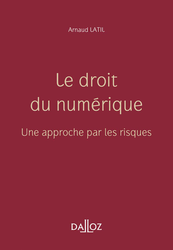
► Référence complète : A. Latil, Le droit du numérique. Une approche par les risques, Hors Collection, Dalloz, 2023, 300 p.
____
____
____
► Résumé de l'ouvrage (fait par l'auteur) : "Le droit du numérique est une matière en pleine construction. Cet ouvrage propose d'éclairer son histoire, ses évolutions et ses nombreuses ramifications. en droit civil, en droit de la consommation et en droit pénal. mais aussi en droit administratif et en matière de libertés fondamentales. Il envisage les activités numériques comme la mise en oeuvre de techniques. au même titre que les techniques industrielles ou scientifiques.
Le droit du numérique est fondé sur une « approche par les risques ». Cette approche est aujourd'hui au centre des politiques publiques européennes et internationales. Elle s'applique au droit des marchés financiers, au droit alimentaire ou encore au droit de la cybersécurité. Ses trois dimensions sont ici explorées : l'approche par les risques est libérale. préventive et résiliente.
Le droit des risques trouve ses racines dans la philosophie et la sociologie des techniques. Il vise la protection de la santé, de la sécurité et des droits fondamentaux en mobilisant des notions complexes. comme la confiance, la neutralité, la souveraineté, l'innovation ou encore la résilience. Le droit des risques reste cependant encore mal connu. Il est pourtant à l'origine de mutations majeures de nos systèmes juridiques.".
________
March 30, 2023
Thesaurus : 08. Juridictions du fond

March 25, 2023
Publications

🌐 follow Marie-Anne Frison-Roche on LinkedIn
🌐subscribe to the Newsletter MAFR Regulation, Compliance, Law
🌐subscribe to the Video Newsletter MAFR Surplomb
____
 ► Full reference: M.A. Frison-Roche, Vigilance, a piece of the European puzzle, Working Paper, March 2023.
► Full reference: M.A. Frison-Roche, Vigilance, a piece of the European puzzle, Working Paper, March 2023.
____
🎤This Working Paper has been done as was made the conclusion of the colloquiul La société vigilante ("Vigilant Company") at the Aix-Marseille University on March 24, 2023 (conference given in French)
____
📝It is also the basis of the article that introduces a special issue on La société vigilante
____
► Summary of this Working Paper: The contributions form a contrasted whole. It should not be concluded that some of them are correct and others false: through the reading that each one makes of the so-called French 2017 "Vigilance law," it is a vision of the world as it should be that each author proposes. Because Compliance Law, which Vigilance is a part, claims to draw the future, it is normal that each author should draw the present Law with a hand that bends in one direction or the other, following their conception of the future world. The whole contributions must be seen as a dialogue.
A lively dialogue, with this French 2017 law receiving a lot of "glory" and a lot of "indignity" on both sides, from which it is necessary to emerge in order to find solutions, because it is a fundamental movement of which this law is only a gateway (I). Whatever one thinks of it, it is all the branches of law that are used, affected, and transformed by Vigilance (II). To master this profound transformation, we must turn to Europe, to the great puzzle of texts recently adopted or in the process of being adopted in the European Union, of which Vigilance is the hallmark (III).
____
🔓read the Working Paper⤵️
March 24, 2023
Conferences
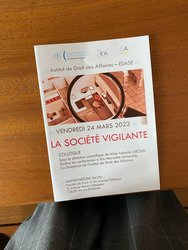
♾️ follow Marie-Anne Frison-Roche on LinkedIn
♾️subscribe Newsletter MAFR Regulation, Compliance, Law
____
► Full Reference: M.-A. Frison-Roche, "Propos introductifs : Les buts monumentaux de la vigilance" (Introductory remarks: The Monumental Goals of Vigilance), in La société vigilante ("The Vigilant Company"), Aix-Marseille University, Institut de Droit des Affaires, March 24, 2023.
____
This conference is done in French; read its English Summary below⤵️
🧮see the complete program of the manifestation (in French)
____
► English Summary of the conference: "Vigilance" is intriguing because, although it occurs in many branches of Law and is familiar in "banking compliance", in a form that is moreover reinforced since it is an obligation of vigilance on the part of the banker about a client whom he/she should "know", it is the "duty of vigilance" that made this notion famous. One could almost say scandalously famous because of a French law of 2017 that now bears its name, called the "Vigilance Law", whereas other laws bear the name of the minister who thought of it, which due diligence (vocabulary used for the European directive) does not erase.
The current challenge is to take the right measure of what "vigilance" is.
Vigilance goes beyond the French Loi Vigilance, which is not enough to express what it is in its few dispositions. To say what it is in the legal system, to use it in practice, to propose the intellectuel legal exercice of qualification, Vigilance must be thought of in Compliance Law, of which it is both a "Tool" and the most advanced point, as shown by the European Directive, whose discussions during its elaboration show these design issues.
Thus, like the whole of Compliance Law, Vigilance is understood, deployed, analysed and exercised through what underpins and gives meaning to all these constantly changing regulations, powers, and obligations, through Compliance Monumental Goals which give it stability and simplicity. This is the least that can be done in a mechanism that has the ambition to organise the "sustainability" of economic relations.
But while Vigilance expresses and concretizes Compliance Monumental Goals, it must not go beyond measure.
In fact, to set up structures, use tools and behave in such a way that human rights and nature are effectively and extraterritorially protected, both negatively and positively, these obligations of the company, which is the natural subject of the "duty", more generally the natural subject of Compliance Law, see its legal powers increased, these means being required for the company to fulfil its new obligations, first legal, then contractual, soon to be unilaterally formulated.
Perhaps we should conceive of a "vigilant company" and not just a company that, beyond and through its economic activity, cares for others and the world, but a company that "watches over" everything and on everything would be to go beyond the measure, to make companies the "regents" of the world and the people who live in it.
Faced with this perspective to be excluded, the construction of a Europe of Compliance, which does not be reduced to corruption fighting or environment protection, and draws on its humanist tradition, distinguishing itself in this respect from the American and Chinese compliance systems, is the major challenge.
Companies are not the alpha and omega, but they are one of the elements of an Alliance between the political Authorities and the population, its link, the one that allows us to escape from the limit of the territory, in what we call by this inadequate term of "extraterritoriality". It is rather a question of going beyond territories, required by the Compliance Monumental Goals of Compliance, of which Vigilance is the advanced point.
____
🚧read the English Working Paper, basis of this conference: "Vigilance, Compliance Monumental Goals, and "Vigilant Company""
____
📈see the slides created for this conference (in French)
____
📝read the article published after this conference
________